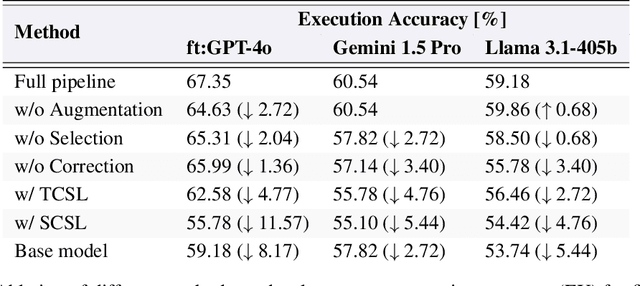Daniel Jaroslawicz
How Many Instructions Can LLMs Follow at Once?
Jul 15, 2025Abstract:Production-grade LLM systems require robust adherence to dozens or even hundreds of instructions simultaneously. However, the instruction-following capabilities of LLMs at high instruction densities have not yet been characterized, as existing benchmarks only evaluate models on tasks with a single or few instructions. We introduce IFScale, a simple benchmark of 500 keyword-inclusion instructions for a business report writing task to measure how instruction-following performance degrades as instruction density increases. We evaluate 20 state-of-the-art models across seven major providers and find that even the best frontier models only achieve 68% accuracy at the max density of 500 instructions. Our analysis reveals model size and reasoning capability to correlate with 3 distinct performance degradation patterns, bias towards earlier instructions, and distinct categories of instruction-following errors. Our insights can help inform design of instruction-dense prompts in real-world applications and highlight important performance-latency tradeoffs. We open-source the benchmark and all results for further analysis at https://distylai.github.io/IFScale.
The Death of Schema Linking? Text-to-SQL in the Age of Well-Reasoned Language Models
Aug 14, 2024



Abstract:Schema linking is a crucial step in Text-to-SQL pipelines, which translate natural language queries into SQL. The goal of schema linking is to retrieve relevant tables and columns (signal) while disregarding irrelevant ones (noise). However, imperfect schema linking can often exclude essential columns needed for accurate query generation. In this work, we revisit the need for schema linking when using the latest generation of large language models (LLMs). We find empirically that newer models are adept at identifying relevant schema elements during generation, without the need for explicit schema linking. This allows Text-to-SQL pipelines to bypass schema linking entirely and instead pass the full database schema to the LLM, eliminating the risk of excluding necessary information. Furthermore, as alternatives to schema linking, we propose techniques that improve Text-to-SQL accuracy without compromising on essential schema information. Our approach achieves 71.83\% execution accuracy on the BIRD benchmark, ranking first at the time of submission.
Retrieve to Explain: Evidence-driven Predictions with Language Models
Feb 06, 2024Abstract:Machine learning models, particularly language models, are notoriously difficult to introspect. Black-box models can mask both issues in model training and harmful biases. For human-in-the-loop processes, opaque predictions can drive lack of trust, limiting a model's impact even when it performs effectively. To address these issues, we introduce Retrieve to Explain (R2E). R2E is a retrieval-based language model that prioritizes amongst a pre-defined set of possible answers to a research question based on the evidence in a document corpus, using Shapley values to identify the relative importance of pieces of evidence to the final prediction. R2E can adapt to new evidence without retraining, and incorporate structured data through templating into natural language. We assess on the use case of drug target identification from published scientific literature, where we show that the model outperforms an industry-standard genetics-based approach on predicting clinical trial outcomes.
 Add to Chrome
Add to Chrome Add to Firefox
Add to Firefox Add to Edge
Add to Edge